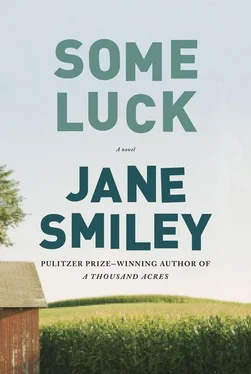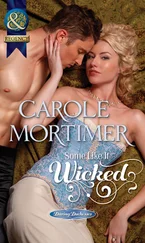“I think if there’s someone Hoover is after, then she thinks that person is by definition innocent, so whatever she’s giving Gubitchev is somehow going to save that person. I think she thinks Hoover has crossed some line, and somehow she can get him punished. He’s a tyrant. It’s a vendetta.”
Arthur stared at him, no longer taking notes. “Did he fuck her?”
“Not in a million years. But he offended her somehow.”
“Uncle Joe is the real tyrant.”
“But Hoover is the tyrant close at hand.” Frank went on, “Well, she gets worked up about it, but why she then decides to pass secrets, if she does, I don’t know.”
As the elevator door opened again, Arthur said, “Not everyone has the same idea about a better world.”
Frank replied, “Some people don’t ever think about a better world.”
ON HIS FIFTY-THIRD BIRTHDAY, Walter went to the doctor without telling Rosanna. He had cleaned the barn and trimmed the Osage orange, and, truthfully, now that they had no animals, the farm work wasn’t much this time of year. You had to get out the equipment and make sure it was in good repair, but if you had put it away in good repair and oiled it and lubed it, which Walter always did, there was not likely to be much of a change through the months of cold. This year they had 500 acres to plant—140 of their own, 180 at the Fredericks’, 100 for his father, and 80 for Rosanna’s father. Joe was planting clover on his place and on part of the Fredericks’ place. About a third of Otto’s fields and a third of Wilmer’s fields were going to lie fallow, which was a good thing, because Walter didn’t like the idea of planting almost eight hundred acres. Even though planting both corn and soybeans stretched out the season somewhat, it was a backbreaking chore, and Walter didn’t care as much for backbreaking chores as he once had — yes, sheep were a pain in the neck, and chickens were irritating, and when you were milking cows, you were always about two seconds away from some sort of accident, if only getting smacked in the face by a frozen tail. His old love of horses had subsided once he saw how “tractable” tractors were. But the place had been lively, hadn’t it? He’d been running around, tearing his hair, never knowing how young he was or how good he had it. One thing he liked about Joe these days, though he didn’t say a word about it, was that Joe knew what he was missing. He was a strong kid (young man now, really — he was twenty-six) with an appropriate air of faint melancholy. Rosanna was always saying to him, “What’s wrong with you? Cheer up! Times are good!” and then shaking her head when he wasn’t around and saying, “He needs to get over Minnie Frederick, is what he needs. She left him behind long ago, at least in her opinion. He’s such a sad sack.”
“He works hard” was what Walter said.
“Who doesn’t?” returned Rosanna. “I need grandchildren in the neighborhood.”
Dr. Craddock looked pretty old himself, and maybe, Walter thought, it was the smoking. When he sat Walter down in his office after examining him, he lit up a Camel, and his fingers trembled when he flicked his ash into the ashtray. His voice was gravelly. “Walter, I’m saying you’re about thirty pounds overweight at this point, though. You’ve gone up from one seventy-eight to one eighty-five in the last year.”
Walter said, “I never weighed a hundred fifty after I got into the army. In boot camp, I weighed one fifty-five.”
“Well, it’s telling on you. Your blood pressure is one eighty over one fifteen, which is pretty dangerous. You’re complaining of headaches and not being able to sleep. You say Rosanna gets up in the night and crosses the hall because you’re snoring. I don’t know that your aches and pains are plain old rheumatism, because there isn’t such a thing as plain old rheumatism. You might have some osteoarthritis, or you might have a touch of gout, and if you have that, then you’ve got to cut back on rich foods and drink, anyway.” Dr. Craddock’s trembling hand reached toward the ashtray again, and the very long ash dropped on the desk. Craddock was as thin as a rail. He said, “You come back next week, and I’m going to do some more tests on you.”
The two of them stood up, and Craddock closed the file as he walked him to the door of the office. He said, “You shouldn’t have come on your birthday. It’s always more depressing that way. Myself, I don’t know whether, when you get to our age, the bad news is you might die or the bad news is that you might live.” He stubbed out the cigarette. Walter didn’t laugh just then, but he did when he was getting into his truck. He laughed right out loud.
ONE OF THE GREAT REVELATIONS of Joe’s life, he thought while he was feeding the rabbits and the two new calves (this year’s named Paulette and Patricia), and watching Nat run after Pepper, was soybeans. Before the war, there were farmers who grew soybeans instead of oats — once they were up, you turned the cows out into the field, and they were pretty good pasture. During the thirties, Walter hadn’t planted soybeans because he had always expected enough rain to grow the crops he preferred, especially oats. Even that worst year — what was it, ’36?—there had been so much snow and ice that Walter had finally rejected planting soybeans. What was he going to get for them? How was he going to harvest and store them? What could you use them for? If you were going to grow beans, then grow beans, was how Walter saw it — pole beans. Soybeans were like oats or clover or alfalfa, but not as useful. Joe, though, loved soybeans. When you planted them, because they were beans, they nitrogenated the soil, and did so much more efficiently than clover. Corn planted in a former soybean field nearly leapt out of the ground. Nor did they care much about rain, either way. The corn could be pale and short, and the beans would be green and thick. Cattle liked them, too. Joe didn’t have a herd of milk cows or beef cows anymore, but farmers who did bought all the beans you could grow. Betty and Boop loved them ground up into meal, and beef raised on ground beans, it was said, had a good flavor — not too high for the city slickers.
But the day before, a guy at the feed store in Denby had walked right up to Joe and said, “How are you fertilizing your fields, Mr. Langdon?” And when Joe turned around to see if Walter had walked in, everyone standing there had a laugh.
Joe had been a bit irritated, so he said, “Why is that your business, Mr.…”
“Bob Reichardt, Mr. Langdon, from Middletown, down by Burlington. This year we are offering a product that we consider to be revolutionary in American farming.”
Joe eased past him, saying only, “There’ve been a lot of those.”
“Hey, Joe,” said Mike Hatton, who’d taken over the feed store from his dad, and who Joe knew was pretty up-to-date (they agreed on a few things, including this Lincoln variety of beans). “He’s not kidding. That Middletown plant was making TNT during the war. Now they’re demobilized.” Everyone laughed again.
“I got some pictures,” said Bob Reichardt. “Down in the southeast corner of the state, we used it pretty extensively last year. A fellow from Iowa State ran a test. Look at these.” He led Joe over to a table Mike had cleared, where he had laid out a set of ten pictures in two rows, right next to each other. Five fields, each photograph taken from a bit of a distance on the right side, and then close-ups of corn plants on the left. In the plant pictures, someone had set calendar pages between the rows — July 1, July 15, July 31, August 15, August 31. The differences were clear, and so startling that Joe was instantly skeptical. The stalks on the right side in the last picture were a third taller than those on the left side, and the ears were bigger, too. The ears looked astonishing. There was one final picture, of two ears side by side, the husks pulled back. The one ear made the other ear look measly by comparison. Bob said, “Same hybrid, same seed stock, same planting date.”
Читать дальше












